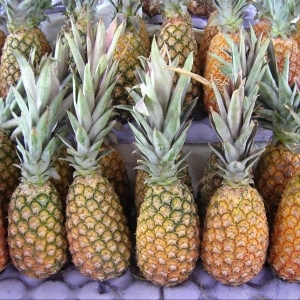
FCRN member Margareta Lelea of the German Institute for Tropical and Subtropical Agriculture (DITSL) has co-authored this paper, which uses the example of the pineapple supply chain in Uganda to argue that efforts to reduce post-harvest losses often neglect the uses of waste streams by local people.
According to the paper, 44% of fruit and vegetables are lost along the supply chain, globally, with that figure being over 50% in sub-Saharan Africa. Conventional views of post-harvest losses paint harvest and handling processes in the Global South as inferior, instead promoting more modern harvesting systems such as refrigerated supply chains.
The authors interviewed several stakeholders in the Ugandan pineapple sector, including farmers, brokers, retailers, and makers of juice, wine and munanasi (a pineapple drink made with black tea, ginger and sugar). The interviews showed that pineapples of various qualities are traded for different purposes - hence, the assessment of what counts as waste depends on the local context. For example, damaged fruit might be sliced and immediately eaten by harvesters, retailers or their families; and overripe fruit or sometimes peels are often used to make munanasi.
The paper concludes that any efforts to reduce post-harvest losses need to take these uses of “waste” into account. Author Lelea told the FCRN “Often reduction of post-harvest losses are pursued with the goal of improving food security. However, technical assessments often miss the bigger picture of all of the various people who are connected, and who use food that is ‘lost’ and how various definitions of quality change the boundary for what is considered ‘useful’ and what is considered ‘lost’. These inter-connections must be considered in each specific context in order to really understand which losses are important and for whom.”
In other words, food that might be classed as being waste is not in fact going to waste, because it is used in a variety of ways.
Abstract
Post-harvest loss (PHL) assessments are usually commodity-oriented and approaches for reducing these losses tend to rely on technological interventions for improving product handling and quality. However, such narrow problem framing neglects the situatedness of PHL, particularly when perishable crops of heterogeneous quality are traded through networks of small-scale value chain actors, as is common in the Global South. To illustrate our critique, we lean on systems as a conceptual construct to unpack PHL with the empirical example of the pineapple value chain in Uganda. Specifically, we aim (i) at surfacing multiple actors’ perspectives related to the spectrum of losses and (ii) to improve understanding of their strategies to deal with related problems. We draw from participant observation, semi-structured interviews and group meetings with farmers, brokers, traders and interlinked actors such as small-scale processors and pig farmers. Our study shows how they navigate existing resource constraints and how their practices to recover potential food losses are embedded in their local food systems. The contextualised understandings of quality and the consequences of what can be considered a loss, challenge dominant narratives about high levels of PHL in Sub-Saharan Africa. Extending system boundaries beyond the fresh-fruit value chain revealed how interlinked actors were able to benefit from using ‘damaged’ fruits. Our findings encourage going beyond generic quality systems towards more diverse understandings of quality and loss. Investigating losses in a systemic and context-specific way can put local perspectives at the forefront to encourage actor-driven approaches for sustainable PHL reduction.
Reference
Tröger, K., Lelea, M. A., Hensel, O. and Kaufman, B. (2020). Re-framing post-harvest losses through a situated analysis of the pineapple value chain in Uganda. Geoforum, 111, pp. 48-61.
Read the full open access paper here. See also the Foodsource building block What is food loss and food waste?







Post a new comment »